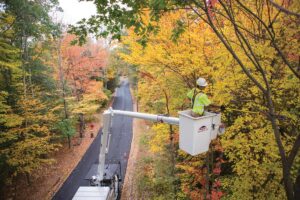You may hit the road to enjoy a vacation or take in a car race or baseball game. If you are traveling in an RV or converted bus, keep in mind using generators to power them can turn deadly.
Today’s higher end recreational vehicles provide many creature comforts of home, such as microwaves, refrigerators and other small appliances. We can now vacation or “leisure” with more conveniences than ever, and generators are often used to power all those appliances, electronics and other gizmos.
Reports of people getting sick and, in some cases, dying from RV-related carbon monoxide poisoning have hit the news in recent years. Carbon monoxide (CO) is an odorless, colorless gas that is produced any time fuel is burned. Along with generators, devices or appliances that produce the invisible gas include vehicles, small engines, grills, fireplaces, camping stoves, gas ranges and furnaces. CO can build up indoors or in any enclosed space and poisons people or animals who breathe it in.
In 2018, one racing fan died and another was hospitalized after they were exposed to CO in a converted bus. The CO poisoning was caused by a gasoline-powered generator that was not properly ventilated.
In 2016, two men were found in a camper in the campground at Talladega Superspeedway. The confirmed cause of death for one was CO poisoning.
Safe Electricity provides tips to enjoy your RV or other mobile digs, whether your generator was factory installed or using a portable one.
- Inspect the exhaust system on the generator before using it and make sure it is in good working order.
- Do not operate a generator with a damaged exhaust system, one that needs repairs or has other problems.
- If using a portable generator, always make sure the exhaust is directed away from the camping area.
- Listen for problems (e.g. surging sound) when starting your generator, especially if it has been inactive for several weeks.
- Run the generator at least once a week. This decreases moisture in the system and lubricates the engine seals and components to prevent carbon buildup.
- Properly maintain your generator.
- Do not use it at night.
Although many are aware CO poisoning can occur in homes, they may not stop to consider it happening in any enclosed space, including a zipped tent or recreational vehicle. For more information about electrical safety, visit SafeElectricity.org.










